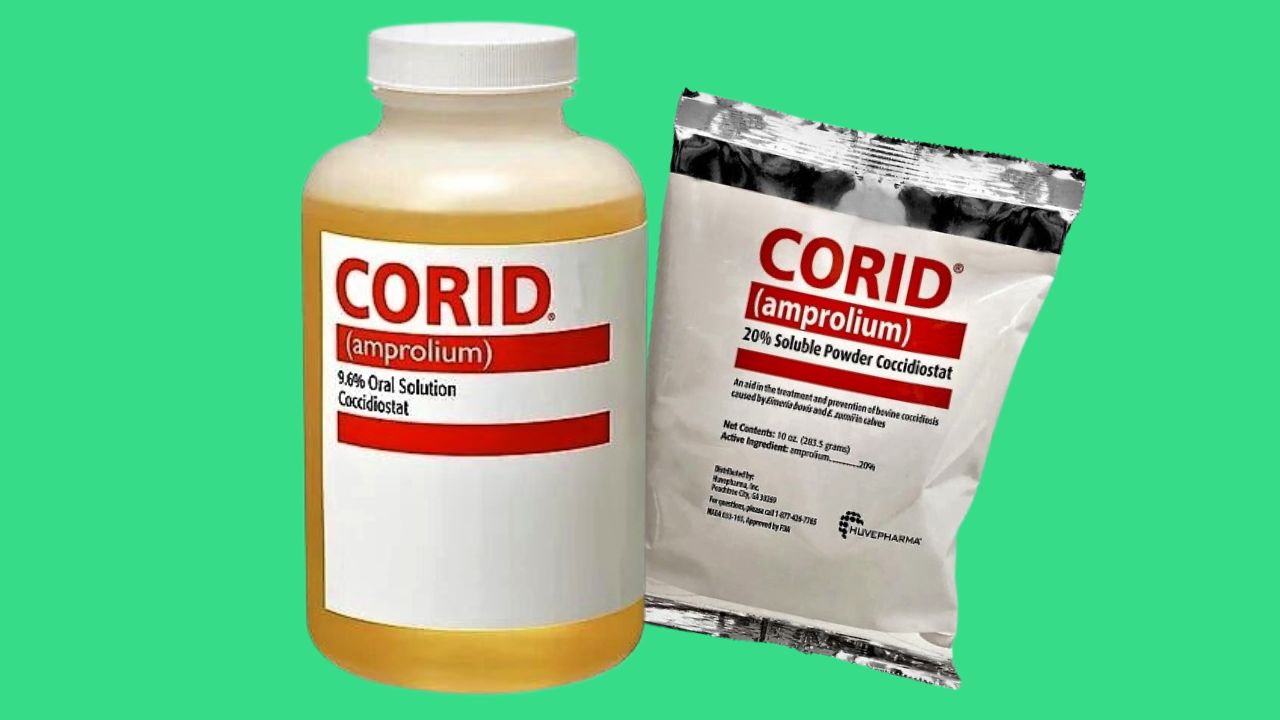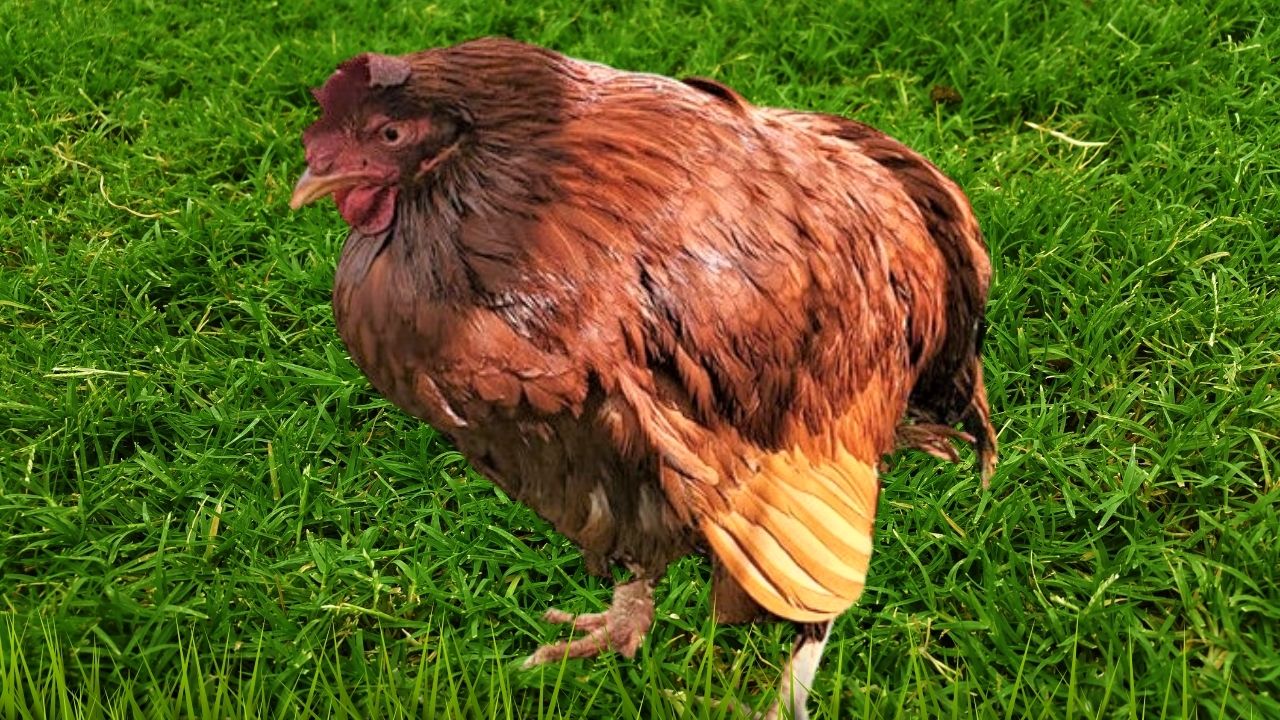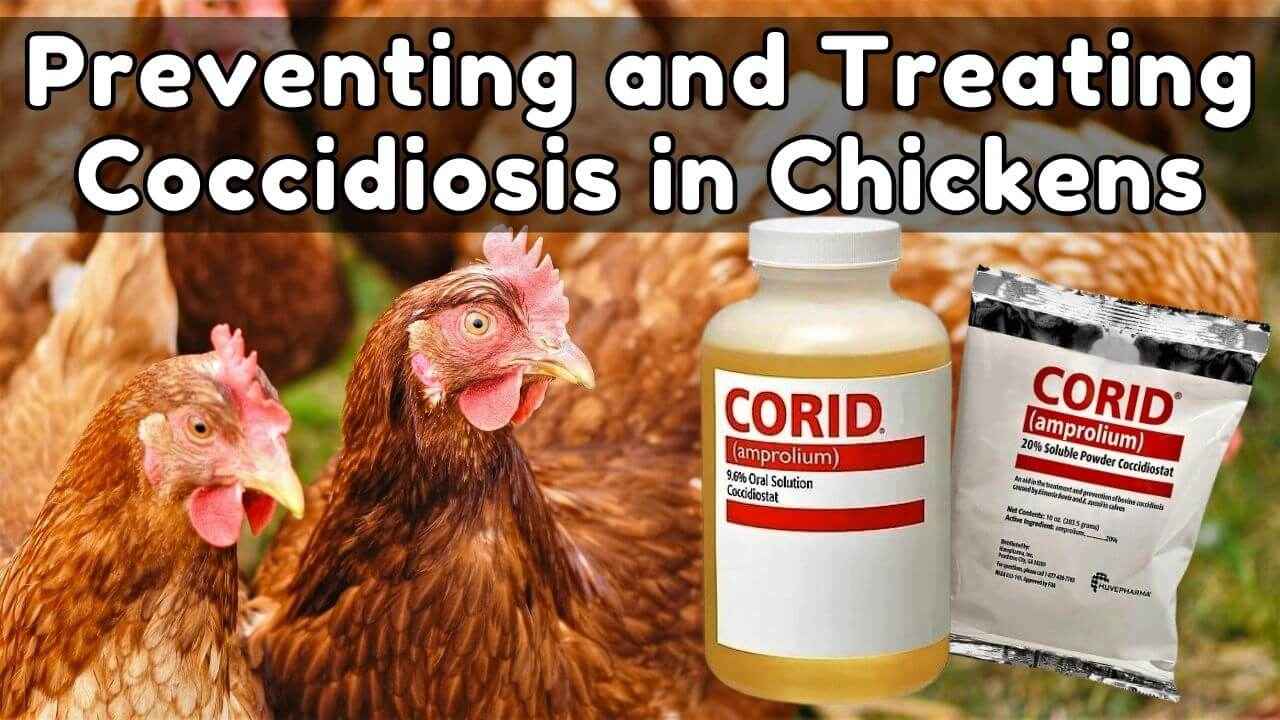If your chickens are suffering from Coccidiosis, a deadly disease that spreads from a chicken to the whole flock and affects the overall health of chickens, even causing death.
But no worries, there is a pretty popular medication called Dose of Corid for Chickens, which is almost safe. However, they have a few side effects when overdosed.
In this article, you will learn about Corid and everything related to it, such as how fast Corid works and how much Corid chickens need.
Understanding Coccidiosis in Chickens
Coccidiosis is a widespread poultry disease caused by protozoan parasites known as coccidia, which infect the intestinal tract of chickens and other birds. These parasites, specifically Eimeria species, invade the intestinal lining, causing caecal Coccidiosis or intestinal Coccidiosis.
The life cycle involves oocysts, microscopic eggs ingested through faecal matter, contaminated food, or dirty water. Once in the intestines, they multiply, leading to over-proliferation and severe intestinal damage.
Symptoms include blood in droppings, mucous in droppings, diarrhea, lethargy, listlessness, ruffled feathers, pale skin color, pale comb, wattles, loss of appetite, weight loss, and failure to grow/thrive.
In severe cases, chickens may appear hunched over, with eyes closed or mucus in the corners of their eyes, and can die if untreated. Young or stressed chicks are particularly vulnerable, with mortality rates reaching up to 50% in severe outbreaks.
Diagnosis requires a fecal float test by a vet for a definitive diagnosis. Droppings should be tested for cocci or worms, as blood or mucus can indicate other issues like egg yolk peritonitis or internal lay in laying age hens.
Early detection lowers the risk of death. Regular daily droppings assessment using a droppings board in the coop helps identify abnormal or bloody droppings.
Prevention of Coccidiosis
Preventing Coccidiosis is critical for poultry health. Here are the key preventative measures:
-
Sanitation: Keep coops, nesting boxes, and roosting bars clean and dry. Damp brooder environments or sewage water promote the multiplication of coccidia. Use poultry nipple drinkers to ensure clean water, and change litter regularly to avoid contaminated conditions.
-
Space Management: To avoid overcrowding, provide 4 square feet per adult bird in the coop, 10 square feet per bird in the run, and 6 square inches of brooder flooring for week-old chicks, with increasing space as they grow.
-
Medicated Starter Feed: For chicks up to 18 weeks, use commercial starter feeds with amprolium to build immunity through gradual exposure.
-
Vaccination: Purchase vaccinated day-old chicks from hatcheries inoculated with a coccidiosis vaccine or live vaccine for resistance to specific coccidia species.
-
Bio-security: Quarantine new flock members for two weeks, restrict chicken yard access, and avoid sharing equipment with fellow chicken-keepers. Wild birds, waterfowl, or spilled water can introduce coccidia via shoes, clothing, or feed on the ground.
-
Natural Remedies: Some chicken farmers use crushed garlic, honey, or a tablespoon of ACV (apple cider vinegar) monthly in food or water as alternative treatments, though not scientifically proven.
Overview Of Corid
| Brand Name | Corid |
| Active Ingredient | Amprolium |
| Use For | Coccidiosis in Chickens |
| Not Effective For | Bacterial, Viral, Fungal Infections |
| Treatment Effective Within | 24 hours |
| Form Available | Liquid and Powder |
| Dosage (Liquid) | 9.6% solution: 10 ml per gallon of water |
| Dosage (Powder) | 20% powder: 0.5-1 teaspoon per gallon of water |
| Treatment Duration | 5–7 days |
| Storage | Store in a cool, dry place |
| Side Effects | Mild, Thiamine deficiency, Lack of appetite, Diarrhea, Neurological Signs when Overdose |
| Precautions | Avoid Overdose |
| Alternative Brands or Similar Brands to Corid | Amprolium 20%, AmproMed®, PROCOC WDP, Amprolium 22% Powder |
| Egg Withdrawal Period | No Recommended Withdrawal Period |
| Meat Withdrawal Period | 3 days |
What is Corid for Chickens?
Corid, also known as Amprol, AmproMed, Amprolium 200, Amprid, or CocciAid, is an FDA-approved anti-parasitic medication for treating and preventing Coccidiosis in poultry.
Its active ingredient, amprolium, is a thiamine antagonist. It inhibits thiamine uptake by coccidia, causing starvation and halting their protozoan lifecycle (Poultry DVM). Corid is available as a 9.6% liquid (containing 96 mg amprolium per ml) or a 20% soluble powder (200 mg amprolium per gram).
Amprolium has a strong safety profile but carries an overdosing risk, potentially causing vitamin K deficiency or thiamine deficiency in chickens.
It’s FDA-approved for egg-laying hens with no egg withdrawal period, making it safe for collecting eggs. For meat poultry, a 24-hour withdrawal period before slaughter is required.
The effects of the Corid dose for chicken will be visible within 2-3 days; sometimes, however, they take a long time to show results, as in the case of extreme infection.
Use the corid dosage for 5-7 days if it dodoesn’thow results in 2-3 days, if your chchicken’sealth is not improved, or if you realise that the dosage does not work. In this case, your chickens have another disease, not Coccidiosis, because corid shows their effect in 5-7 days.

Signs and Symptoms Of Coccidiosis
If you see these signs and symptoms in your chickens, try to start treating them:
- Rapid Decline in Health
- Decreased Appetite
- Mucus in Droppings
- Bloody Diarrhea
- Blood in droppings,
- Lethargy
- Listlessness,
- Ruffled feathers
- Pale comb and wattles
- Weight loss
- Failure to grow/thrive
- Pale Skin Colour
- Huddling Together
- Skin goes from Bad to Worse
- Droopy Behavior

How to Administer Corid Effectively?
The optimum result will come when you use your medications correctly and prioritise. Below are the instructions to use Corid effectively:
- Before administering Corid to your chickens, observe your flock for signs and symptoms of Coccidiosis, such as bloody stools, decreased appetite, and bloody diarrhoea.
- Corid is available in liquid and powder forms. Choose the correct one that is accessible and your preference, and decide on a form.
- To make the medicated water, mix 10 ml of the 9.6% liquid solution per gallon of water. For the 20% powder form, use 0.5 to 1 teaspoon per gallon. Mix thoroughly to distribute the medicine evenly.
- Use only the medicated water you prepared; Your chickens should drink only this water. Remove any other water sources to make sure they get the Corid medicine.
- Change the medicated water daily to keep it fresh and clean. Old or dirty water can harm your birds, making the treatment less effective.
- Give your chickens Corid medication for 5-7 days, even if they seem better. This makes sure we get rid of the parasites completely.
- After the treatment, give your chickens vitamins and probiotic supplements to help them retain nutrients and stay healthy.
Dosage Instructions for Corid
Correct dosage levels are crucial for medication efficacy and bird health. Corid dosages depend on the outbreak severity and are administered via drinking water or oral drench.
Below are the FDA-recommended dosing instructions for poultry.
Liquid Form (9.6% Solution):
|
Outbreak Type |
Dosage |
Amprolium Concentration |
Treatment Duration |
|---|---|---|---|
|
Severe Outbreak |
2 tsp per gallon (9.5 cc) |
0.024% (240 mg/L) |
5 days |
|
Moderate Outbreak |
1 tsp per gallon |
0.012% (120 mg/L) |
5 days |
|
Preventative |
1/2 tsp per gallon |
0.006% (60 mg/L) |
21 days |
Powder Form (20% Soluble Powder):
|
Outbreak Type |
Dosage |
Amprolium Concentration |
Treatment Duration |
|---|---|---|---|
|
Severe Outbreak |
1.5 tsp per gallon (~4.5 g) |
0.024% (240 mg/L) |
5 days |
|
Moderate Outbreak |
3/4 tsp per gallon (~2.25 g) |
0.012% (120 mg/L) |
5 days |
|
Preventative |
1/3 tsp per gallon (~1 g) |
0.006% (60 mg/L) |
21 days |
Note: 1 teaspoon of 9.6% liquid is approximately 5 ml, containing 480 mg amprolium. 1 teaspoon of 20% powder is roughly 3 g, containing 600 mg amprolium (density varies; use a gram scale for precision).
Mixing and Administering Corid
Mixing instructions ensure therapeutic dosing:
-
Liquid Corid: Measure 2 teaspoons (severe), 1 teaspoon (moderate), or 1/2 teaspoon (preventative) per gallon of drinking water. Stir thoroughly in a medication barrel or container.
-
Powder Corid: Measure 1.5 teaspoons (severe), 3/4 teaspoon (moderate), or 1/3 teaspoon (preventative) per gallon. Dissolve completely to avoid clumping.
Daily preparation is essential; discard unused medicated water after 24 hours. Ensure it’s the sole source of drinking water to guarantee medication administration. For sick chickens not drinking, dip their beak gently to encourage intake. Poultry nipple drinkers help maintain clean water.
Oral Drench for Individual Birds:
For sick or non-drinking chickens, an oral drench is effective:
-
9.6% Liquid: Administer 0.1 ml per pound of body weight (or 0.02 ml per 100 grams) orally, once or twice daily for 1-3 days. For a 5-pound chicken, give 0.5 ml per dose.
-
20% Powder: Mix 1/2 teaspoon with 2 teaspoons of water to create a suspension. Administer 0.34 ml (severe) or 0.07 ml (moderate) per pound of body weight.
Body weight calculation ensures accurate dosage calculation. Use a gram scale for precision.
Treatment Duration and Follow-up
The treatment schedule typically involves:
-
Initial Treatment: 5-7 days at the therapeutic dose (severe or moderate).
-
Follow-up: 7-14 days at the preventative dose to kill remaining protozoa and build immunity. For severe outbreaks, continue with 0.006% amprolium for additional weeks.
If no improvement is seen within 3 days, consult a veterinarian to confirm the diagnosis. Monitor for mucousy poop, watery droppings, or feathers ruffled to assess efficacy.
Additional Care During Treatment
-
Sanitise and Disinfect: Clean coops, nesting boxes, and roosting bars with a 10% ammonia solution to eliminate oocysts. Remove contaminated bedding and ensure a dry environment.
-
Vitamins and Electrolytes: After treatment, use Rooster Booster Poultry Cell, Save a Chick electrolytes, or Nutri-Drench to replenish thiamine (vitamin B1) and support avian health. Avoid vitamins during treatment, as they can be counterproductive.
-
Avoid Other Medications: Do not use dewormers or other medications concurrently to maintain medication strength.
-
Egg Safety: Corid has no egg withdrawal period, so eggs are safe for consumption during treatment.
When to Avoid Corid?
In some cases, the Corid medication will act oppositely, so in that case, you will need to avoid Corid:
- If your chickens have fatty liver or other acute or severe diseases.
- When giving Vitamin B1 alongside other supplements.
- When chickens are allergic to Amprolium.
- During the peak production cycle of laying hens.
Egg and Meat Withdrawal Periods
When using Corid (amprolium) for coccidiosis treatment, understanding withdrawal periods ensures food safety:
-
Eggs: The FDA approves amprolium for laying hens with no egg withdrawal period. Eggs can be safely consumed during and after treatment, though traces of amprolium may be detectable in egg yolk for up to 10 days, at levels deemed safe.
-
Meat: No withdrawal period is required for meat poultry when Corid is used according to label instructions. The FDA considers meat from treated birds safe for consumption without a waiting period, though some sources suggest a precautionary 24-hour wait before slaughter.
Always follow package instructions and consult a veterinarian for clarity on food safety.
Precautions When Using Corid
To ensure safe and effective use of Corid, follow these precautions:
-
Accurate Dosage: Measure dosages precisely using a gram scale, especially for 20% powder, to avoid overdosing risks that can lead to thiamine deficiency.
-
Avoid B Vitamins: Do not give B vitamins, particularly thiamine, during treatment, as they can reduce medication efficacy by counteracting amprolium’s action.
-
Sole Water Source: Ensure medicated water is the sole source of drinking water to guarantee proper medication administration.
-
Daily Fresh Mixture: Mix fresh medicated water daily to maintain efficacy and discard any unused portion after 24 hours.
-
Individual Treatment: For sick birds, calculate oral drench doses based on body weight to prevent overdosing.
-
Monitor Birds: Watch for adverse reactions or worsening symptoms, and consult a veterinarian if issues arise.
Potential Side Effects of Corid
Corid is generally safe when used as directed, but potential side effects include:
-
Digestive Issues: Some chickens may experience diarrhea or decreased appetite during treatment.
-
Reduced Egg Production: A temporary drop in egg production may occur.
-
Anemia: In rare cases, anemia can develop, particularly with prolonged use.
-
Thiamine Deficiency: Overdosing or extended use can cause thiamine deficiency, leading to neurological symptoms like incoordination, weakness, or, in severe cases, death. These are reversible with thiamine supplementation post-treatment.
-
Other Effects: High doses or prolonged treatment may cause anorexia and persistent diarrhea.
Final Thoughts on Dose of Corid
Coccidiosis management requires vigilance, proper medication dosage, and robust farm management. Corid, whether liquid amprolium or powder formulation, is a reliable poultry medicine for coccidia control.
By adhering to treatment protocols, maintaining clean and dry living quarters, and implementing preventative measures like vaccines or medicated feed, you can ensure flock health and minimise the ramifications of this intestinal parasite.
Regular diagnosis and sanitation are key to thriving commercial poultry or backyard chickens.
Has your chicken suffered from any deadly disease?
FAQs
What is the correct dosage for Corid oral drench for chickens?
For 9.6% liquid Corid: Administer 0.1 ml per pound of body weight orally, once or twice daily for 1-3 days. For 20% powder Corid: Mix 1/2 teaspoon of powder with 2 teaspoons of water, then give 0.34 ml of this solution per pound of body weight orally, once or twice daily for 1-3 days. This is typically used alongside medicated water for the flock.
How often should I administer the Corid oral drench?
The drench can be given once or twice a day for 1-3 days, depending on the severity of the coccidiosis symptoms. For mild cases, once daily may be sufficient; for severe cases, twice daily is recommended. Consult a veterinarian for tailored advice.
Can I use Corid for other poultry or animals besides chickens?
Yes, Corid is safe for other poultry like turkeys and ducks, as well as livestock such as calves, to treat coccidiosis. However, dosages vary by species and weight, so follow specific guidelines for each animal type.
Are there any side effects or precautions I should be aware of when using Corid?
Rarely, chickens may experience mild digestive upset (e.g., diarrhea or reduced appetite). Overuse can potentially cause a vitamin B1 (thiamine) deficiency.
Use accurate dosing, avoid prolonged treatment beyond recommendations, and ensure a balanced diet to prevent deficiencies.
How do I know if the Corid treatment is working?
Look for these signs within 24-48 hours: Increased energy and appetite, Reduced bloody or watery droppings and Return to normal behavior.
Can I give the Corid oral drench directly without mixing it in water?
Yes, the oral drench is designed to be given directly to individual birds using a syringe for precise dosing. For treating an entire flock, mixing Corid in drinking water is more practical.
What should I do if my chickens won’t drink the medicated water?
Administer the Corid oral drench directly with a syringe. Ensure the drinking water is fresh and clean, and consider adding a small amount of sugar or electrolytes to encourage drinking.
Can I use Corid as a preventive measure, or is it only for treatment?
Corid can be used for both treatment and prevention. For prevention, use a lower dose over a longer period (e.g., 21 days), especially in high-risk situations like wet weather or new flock introductions.
How long should I continue the treatment?
For treatment, give the oral drench for 1-3 days, often alongside a 5-day course of medicated water. A lower dose may follow for 7-14 days to prevent recurrence. Adjust based on the bird’s response.
Is there a withdrawal period for eggs or meat after using Corid?
Eggs: No withdrawal period is required; Corid is approved for laying hens.
Meat: Withdraw the medication 24 hours before slaughter. Verify with local regulations or a veterinarian.
What Happens If a Chicken Overeats Corid?
If a chicken eats too much Corid (amprolium), it might get sick because of an overdose. Young chickens might not grow as fast. Too much Corid can lower Vitamin B1, making them tired or wobbly, chicken might lose their appetite or get dehydrated. In rare cases, too much Corid could even be deadly.
How Do I Store Corid for My Chickens?
Storing Corid the right way keeps it working well. Store at room temperature (60-90°F), away from wet spots. Put it in a dark place, like a cabinet. Use an airtight container or keep the lid closed to block moisture. Store it where kids can’t reach it.
At What Age Can You Give Corid to Chickens?
You can give Corid to chickens at any age – even tiny chicks just a few days old! Use less for younger or smaller chickens. They can tell you the perfect dose for your flock.
How to Give Corid to Chickens Orally?
Mix Corid into their water, 2 tsp per gallon for liquid (9.6%) or 1.5 tsp for powder (20%). Use it as their only water for 5–7 days, changing it daily. Make sure they drink it, and finish the full course even if they look better.

Hello! I’m Ibrahim, the owner and writer of this blog. I run a chicken farm with 160 chickens, and I’ve gained a lot of knowledge about raising and caring for them. Now, I want to share my insights and experiences with you to help you in chicken keeping.


5 thoughts on “Dose of Corid for Chickens To Prevent and Treat Coccidiosis”